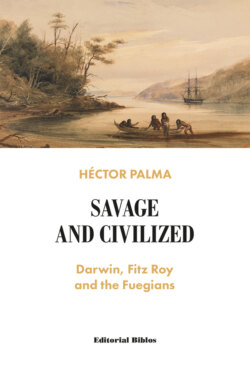Savages and civilized

Реклама. ООО «ЛитРес», ИНН: 7719571260.
Оглавление
Héctor Palma. Savages and civilized
SAVAGE AND CIVILIZED
Index
INTRODUCTION. An Amazing Journey
CHAPTER 1. Background and Personages
The Adventure and the Beagle Expeditions
The Protagonists: Charles Darwin, Robert Fitz Roy, and the Fuegians
CHAPTER 2. The Capture. Four Fuegians on their Way to London
In England
The Impact on London Newspapers
Observations about the Fuegians
Savage and Abject
Thieves
Cannibalism
The Language
Difficulties in Understanding the Other
Scientific Description of the Fuegians
CHAPTER 3. Coming Home. Arrival and Reception
Last Encounter with Jemmy
Voyages to Malvinas
CHAPTER 4. After the Beagle. Darwin and Fitz Roy
The Fuegians
Woollya Massacre
The Fuegians in Literature
CHAPTER 5. The Nineteenth Century: Evolutionism, Racism and Human Hierarchies
An Evolutionary Century
Time: Epistemic Centrality, Linearity, Irreversibility and Variability
Change: Immanence, Stages and Directionality, Progress and Decadence, Continuity and Novelty
The Darwinian Theory
Sociohistorical Evolutionism and Biological Evolution
Diversity, Inequality, Racism and other Hierarchies
CHAPTER 6. Empire, Affection and Tragedy
References
Отрывок из книги
On a sunny January morning in 1833, through one of the Southern Channels of Tierra del Fuego, a British vessel sails alongside a smaller boat. The natives of the area, through screams and smoke, quickly communicate with each other the novelty, and dozens of canoes with hundreds of natives emerge to observe the peculiar event. Curious and friendly for the most part, somewhat aggressive at times, they observe the smallest boat approaching the shore with three Fuegians (two men and one woman) returning to their homeland after almost a year in London. To the surprise of their compatriots, who receive them almost naked, these three Fuegians dressed in European clothes, with short hair, speak English and they bring with them porcelain tea sets, bed linens, hats and dresses. This unique scene is only a small part of a larger story that was headed to oblivion at that hostile Southern tip of South America, except for the fact that it was part of extensive passages in the journey diaries of the two British protagonists of the same story: the expedition captain Robert Fitz Roy and the naturalist on board, and eventually one of the most influential scientists in the modern world, Charles Darwin. But in addition to those direct testimonies, a more or less standard version has been installed, restated time after time for almost two centuries; with a series of assumptions and errors that deserve to be reviewed and reassessed. The aim of this book is to reconstruct this story and, above all, review it from a critical perspective.
HÉCTOR A. PALMA is a Philosophy Professor (University of Buenos Aires), Master of Science, Technology and Society (University of Quilmes) and PhD in Social Sciences and Humanities (University of Quilmes). He is currently a Professor-Researcher at the University of San Martín and University of Hurlingham. His most significant books are Gobernar es seleccionar: historia y reflexiones sobre el mejoramiento genético en seres humanos (2005), Filosofía de las ciencias: temas y problemas (2008), Infidelidad genética y hormigas corruptas: una crítica al periodismo científico (2012), Ciencia y metáforas: crítica de una razón incestuosa (2016), Huellas de Darwin en la Argentina (2016) and Mejoramiento genético en humanos: de la eugenesia al transhumanismo (2019). He edited the books Epistemología de las ciencias sociales (2012) and Conexiones y fronteras: desafíos filosóficos de las ciencias sociales en el siglo XXI (2017).
.....
Apart from Humboldt’s book (Personal Narrative), Darwin took the Bible and the recently-released first volume of Lyell’s Principles of Geology, which suggested a new vision of the Earth’s geological changes (uniformitarianism), and that strongly influenced him. Lyell stated that the geological characteristics of the Earth are the product of a slow and continuous process of causes in constant operation, contrary to what catastrophists stated (that they were out of large and sporadic cataclysms). In addition, Lyell believed, compared to most naturalists of his time, that the age of the Earth dated back several million years.
The Darwin who sets sail on the Beagle is merely a lucid and restless 22-year-old man, enthusiastic about outdoor life and horseback riding, and who had never imagined the central role he would play in the history of science and in the Western culture. However, in the Diary he completed to be published upon his return, he describes with great care those naturalist’s issues and also gives anthropological and sociological considerations on the inhabitants of the visited regions, as an experienced professional rather than a restless young man. This shows his vast analytical observation skills as well as great conceptual creativity to develop plausible hypotheses. But at that point, he was not the Darwin who published, almost three decades later, one of the most important books of the nineteenth century, On the Origin of Species by Means of Natural Selection or the Preservation of the Favoured Races in the Struggle for Life (hereon The Origin). It was still many years before Darwin could finally shape up his theory, though some findings in Punta Alta (south of Buenos Aires province), in the Andean Mountains, in Patagonia, and on the Galapagos Islands hold an outstanding place in the future puzzle of evolution. There is nothing in Narrative (Volume III) to conclude that the idea of evolution would have appeared during that voyage, except for trivial Argentinian, Chilean or Ecuadorian chauvinism about a privileged place and an exact moment that helped Darwin with his dangerous idea.
.....